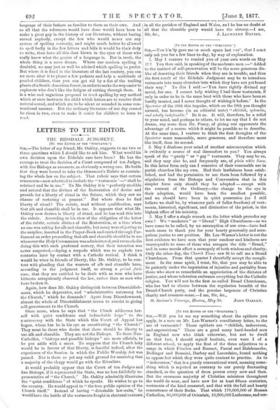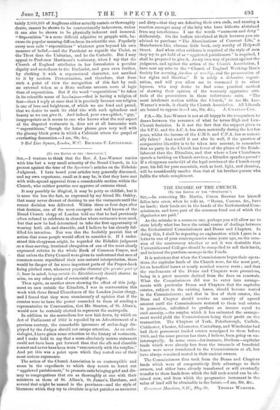[TO THE EDITOR OF THE " SPECTATOR.1 Sin,—Will you let
me say something about the epithets you apply, in a note on Mr. Lee-Warner's conciliatory letter, to the use of vestments ? Those epithets are "childish, indecorous, and superstitious." There are a good many hard-headed men in England now who think otherwise, but not to dwell on that fact, I should myself hesitate, even were I of a different school, to apply the first of the three adjectives to a usage in which Fenelon and Bossuet, Pascal and Malebranche, Dellinger and Rosmini, Darboy and Lacordaire, found nothing to oppose but which they were quite content to practise. As to "indecorous," that is a purely conventional word, meaning some- thing which is rejected as contrary to our purely fluctuating standard, as the question of dress proves every now and then. But the enormous majority of Christian ministers throughout the world do wear, and have now for at least fifteen centuries, vestments of the kind censured, and that with the full and hearty concurrence of their flocks. That which 170,000,000 of Roman Catholics, 80,000,000 of Orientals, 10,000,000 Lutherans, and cer-
tainly 2,000,000 of Anglicans either actually sustain or thoroughly desire, cannot be shown to be conventionally indecorous, unless it can also be shown to be physically indecent and immoral. " Superstition " is a more difficult adjective to grapple with, be- cause its popular meaning differs from its scientific one. Popularly every man calls " superstitious " whatever goes beyond his own -measure of belief,—and the Pantheist so regards the Theist, as the Thest does the Unitarian, and he the Catholic. But I may appeal to Professor Martineau's testimony, when I say that the Church of England attributes in her formularies a peculiar dignity and sacredness to the Eucharist, and goes even further, by clothing it with a supernatural character, not ascribed to it by modern Protestantism, and therefore, that from such a point of view the recognition of this fact by such an external token as a State uniform savours more of logic than of superstition. But if the word "superstitious" be taken in its scientific sense of 4igi'oxisa,—that is having a religion of fear—then I reply at once that it is precisely because our religion is one of love and brightness, of which we are fond and proud, that we desire to mark its chief rite with such splendour and beauty as we can give it. And indeed, your own epithet, " gay," inappropriate as it seems to one who knows what the real aspect of the disputed vestments is, does not at all harmonise with -" superstitious," though the latter phrase goes very well with the gloomy black gown in which a Calvinist utters the gospel of everlasting damnation.—I am, Sir, &c.,
9 Red Lion Square, London, TV.C. RICHARD F. LITTLEDALE.



































 Previous page
Previous page